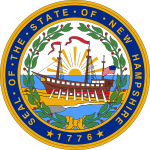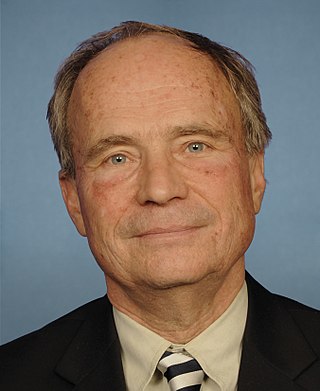
Charles Foster Bass is an American politician and member of the Republican Party who served as a member of the United States House of Representatives for New Hampshire's 2nd congressional district from 1995 to 2007 and 2011 to 2013. He is the son of Perkins Bass, who also represented the same New Hampshire district from 1955 to 1963.

The 1860–61 United States House of Representatives elections were held on various dates in various states between August 6, 1860, and October 24, 1861, before or after the first session of the 37th United States Congress convened on July 4, 1861. The number of House seats initially increased to 239 when California was apportioned an extra one, but these elections were affected by the outbreak of the American Civil War and resulted in over 56 vacancies.

The 1846–47 United States House of Representatives elections were held on various dates in various states between August 2, 1846, and November 2, 1847. Each state set its own date for its elections to the House of Representatives. 228 elected members representing 29 states took their seats when the first session of the 30th United States Congress convened December 6, 1847. The new states of Iowa and Texas elected their first representatives during this election cycle. These elections were held during President James K. Polk's term.
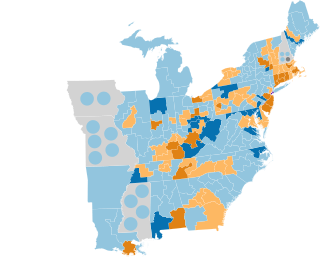
The 1844–45 United States House of Representatives elections were held on various dates in various states between July 1, 1844, and November 4, 1845. Each state set its own date for its elections to the House of Representatives. 224 elected members representing 27 states took their seats when the first session of the 29th United States Congress convened on December 1, 1845. The new state of Florida elected its first representative during this election cycle, while one vacancy in New Hampshire's delegation remained unfilled for the duration of the 29th Congress.

The 1810–11 United States House of Representatives elections were held on various dates in various states between April 24, 1810, and August 2, 1811. Each state set its own date for its elections to the House of Representatives before the first session of the 12th United States Congress convened on November 4, 1811. They occurred during President James Madison's first term. Elections were held for all 142 seats, representing 17 states.

The 1808–09 United States House of Representatives elections were held on various dates in various states between April 26, 1808, and May 5, 1809. Each state set its own date for its elections to the House of Representatives before the first session of the 11th United States Congress convened on May 22, 1809. They coincided with James Madison being elected as president. Elections were held for all 142 seats, representing 17 states.

The 1802–03 United States House of Representatives elections were held on various dates in various states between April 26, 1802 and December 14, 1803. Each state set its own date for its elections to the House of Representatives, either before or after the first session of the 8th United States Congress convened on October 17, 1803. They occurred during President Thomas Jefferson's first term in office.

The 1800–01 United States House of Representatives elections were held on various dates in various states between April 29, 1800, and August 1, 1801. Each state set its own date for its elections to the House of Representatives before the first session of the 7th United States Congress convened on December 7, 1801. They were held at the same time as the 1800 presidential election, in which Vice President Thomas Jefferson, a Democratic Republican, defeated incumbent President John Adams, a Federalist. Elections were held for all 105 seats, representing 15 states.

The 1796–97 United States House of Representatives elections took place in the various states took place between August 12, 1796, and October 15, 1797. Each state set its own date for its elections to the House of Representatives. The size of the House increased to 106 seats after Tennessee became the 16th state to join the union. The first session of the 5th United States Congress was convened on May 15, 1797, at the proclamation of the new President of the United States, John Adams. Since Kentucky and Tennessee had not yet voted, they were unrepresented until the second session began on November 13, 1797.
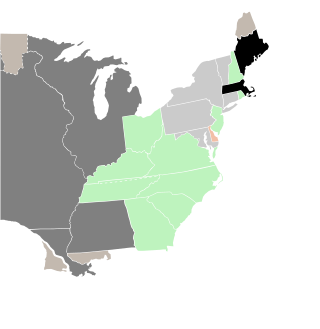
The 1810–11 United States Senate elections were held on various dates in various states. As these U.S. Senate elections were prior to the ratification of the Seventeenth Amendment in 1913, senators were chosen by state legislatures. Senators were elected over a wide range of time throughout 1810 and 1811, and a seat may have been filled months late or remained vacant due to legislative deadlock. In these elections, terms were up for the senators in Class 2.
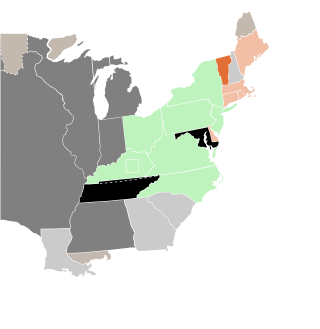
The 1814–15 United States Senate elections were held on various dates in various states. As these U.S. Senate elections were prior to the ratification of the Seventeenth Amendment in 1913, senators were chosen by state legislatures. Senators were elected over a wide range of time throughout 1814 and 1815, and a seat may have been filled months late or remained vacant due to legislative deadlock. In these elections, terms were up for the senators in Class 1.

The 2012 United States presidential election in New Hampshire took place on November 6, 2012, as part of the 2012 United States presidential election in which all 50 states plus the District of Columbia participated. New Hampshire voters chose four electors to represent them in the Electoral College via a popular vote pitting incumbent Democratic President Barack Obama and his running mate, Vice President Joe Biden, against Republican challenger and former Massachusetts Governor Mitt Romney and his running mate, Congressman Paul Ryan.

The 2014 United States Senate election in New Hampshire was held on November 4, 2014, to elect a member of the United States Senate to represent the state of New Hampshire, concurrently with the election of the governor of New Hampshire, as well as other elections to the United States Senate in other states and elections to the United States House of Representatives and various state and local elections.

The 2020 United States Senate election in New Hampshire was held on November 3, 2020, to elect a member of the United States Senate to represent the State of New Hampshire, concurrently with the 2020 U.S. presidential election, as well as other elections to the United States Senate, elections to the United States House of Representatives and various state and local elections. Incumbent Democratic Senator Jeanne Shaheen won reelection to a third term after comfortably defeating Republican nominee Bryant Messner by 15.6 points and sweeping every single county in the state. This marked the first Senate election since 1972 in which the Democrat carried Belknap County.
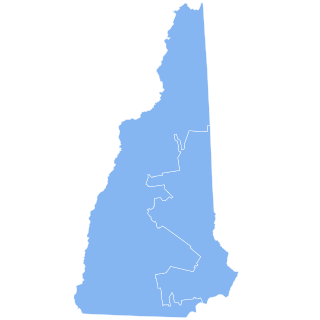
The 2018 United States House of Representatives elections in New Hampshire were held on November 6, 2018, to elect the two U.S. representatives from the state of New Hampshire, one from each of the state's two congressional districts. The elections coincided with other elections to the House of Representatives, elections to the United States Senate and various state and local elections.

The 2020 United States House of Representatives elections in New Hampshire were held on November 3, 2020, to elect the two U.S. representatives from the state of New Hampshire, one from each of the state's two congressional districts. The elections coincided with the 2020 U.S. presidential election, as well as other elections to the House of Representatives, elections to the United States Senate and various state and local elections.
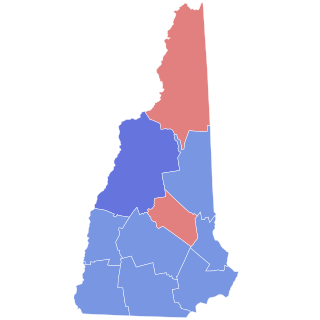
The 2022 United States Senate election in New Hampshire was held on November 8, 2022, to elect a member of the United States Senate to represent the State of New Hampshire. The primary elections were held on September 13, 2022. Incumbent Senator Maggie Hassan was re-elected over Republican retired brigadier general Don Bolduc by an unexpectedly large margin of 9.1% that surpassed most polls. Hassan won her initial bid for this seat in 2016 by only 1,017 votes or 0.14%. This election marked the first time a Democrat won re-election to New Hampshire's class 3 Senate seat.

The 2022 United States House of Representatives elections in New Hampshire were held on November 8, 2022, to elect the two U.S. representatives from the state of New Hampshire, one from each of the state's two congressional districts.

The 2022 New Hampshire gubernatorial election was held on November 8, 2022, to elect the governor of New Hampshire. As New Hampshire does not have gubernatorial term limits, incumbent Republican Governor Chris Sununu won re-election to a fourth two-year term in office against Democratic nominee Tom Sherman, with a 15.5% margin.

Beginning shortly after the city's incorporation as a city in 1846, elections have been held in the mayor of Manchester, New Hampshire. The following article provides information on the elections for mayor in the city during the 21st century.
